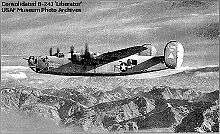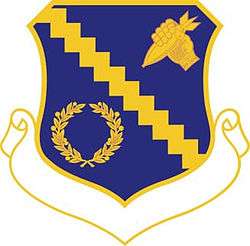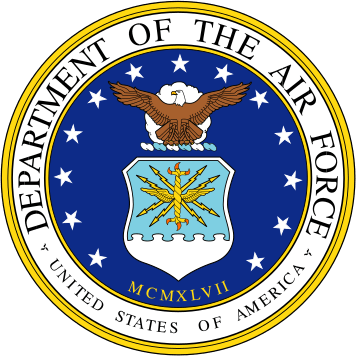98th Operations Group
| 98th Operations Group | |
|---|---|
|
Emblem of the 98th Operations Group | |
| Active | 1942–1945; 1947–1952; 1992–1994; 2001–present |
| Country | United States |
| Branch | United States Air Force |
| Part of | 98th Range Wing |
| Garrison/HQ | Nellis Air Force Base |
The 98th Operations Group (98 OG) is a component unit of the 98th Range Wing, assigned to the United States Air Force (USAF) Air Combat Command. The group is stationed at Nellis Air Force Base, Nevada.
During World War II, the group's predecessor unit, the 98th Bombardment Group was a Consolidated B-24 Liberator heavy bomb group that fought in North Africa and Italy. Two of its members, Colonel John R. (Killer) Kane and First Lieutenant Donald Pucket were awarded the Medal of Honor for their actions in combat. The group flew a total of 417 missions, earning a total of 15 battle streamers as well as two Presidential Unit Citations.
In the postwar era, the 98th Bombardment Group was one of the first United States Army Air Forces units assigned to the Strategic Air Command on 1 July 1947, prior to the establishment of the USAF. Equipped with low-hour Boeing B-29 Superfortress World War II aircraft, it was deployed to Far East Air Force in 1950 and flew combat missions over North Korea early in the Korean War. The group was inactivated in 1952 when the parent wing adopted the Tri-Deputate organization and assigned all of the group's squadrons directly to the wing. It was reactivated in 1987 as the 98th Air Refueling Group, Heavy; as an Air Force Reserve associate unit of the 434th Air Refueling Wing.
Overview
The 98th OG is a non-flying unit that commands two squadrons with 55 military and civil service personnel and has functional responsibility for approximately 300 contract personnel. It provides day-to-day control of the Nevada Test and Training Range (NTTR); directly supports Air Force, joint and multi-national test and training activities; and operates two Air Combat Command bombing ranges: NTTR and Leach Lake Tactics Range, near Barstow, California.
It prioritizes and schedules all range activities for all range users, provides ground control intercept operations, flight-following safety deconfliction, simulated threat command and control operations, communications, data link operations, and range access control. It also assists test customers by coordinating support activities, and coordinates airspace issues with military and federal agencies.
Components
- 98th Operations Support Squadron
- The 98th OSS is the scheduling, command and control and project support authority for NTTR operations. The Weapons and Tactics Flight provides qualified ground control intercept and Link 16 operations for more than 5,000 test and training sorties per year on the NTTR. The Current Operations Flight is responsible for range scheduling, range monitoring and advisory control (Blackjack), and provides a comprehensive debrief tool for combat air forces aircrews. The Operations Plans Flight coordinates all exercise, test and experimentation customer assistance.
- 98th Range Squadron
- The 98th RANS is responsible for technical support of Air Force, joint and multinational aircrew training on the NTTR. The Communications Flight provides small computer hardware and software support and all communications. The Operations and Maintenance Flight provides operation, maintenance and deployment of threat systems, mission control and debriefing systems, time-space-position indicator/scoring systems and Roulette (Red Forces Command and Control). The Engineering Flight conducts research, engineers, develops and manages hardware and software projects.
History
- See 98th Range Wing for additional history and lineage
World War II


The 98th trained for bombardment missions with B-24 Liberators during the first half of 1942.
The group was alerted and departed for the Middle East on 15 July 1942, arriving in Palestine in late July 1942. The 98th was initially assigned to the USMEAF (United States Middle East Air Force). However, the USMEAF was dissolved on 12 November 1942. At that time, the 98th came under the 9th Air Force. It flew its first mission to Mersa Matruh, Libya on 1 August 1942, with the aircraft being serviced by Royal Air Force personnel until 98th maintenance personnel arrived in mid-August 1942.
It supported the British Eighth Army in its westward advance from Egypt into Libya and Tunisia. It bombed shipping and harbor installations in North Africa, Sicily, Italy, Crete, and Greece to cut enemy supply lines to Africa and to prepare for the Allied invasion of Italy. The 98th earned a Distinguished Unit Citation (DUC) for action against the enemy in the Middle East, North Africa, and Sicily from August 1942 to August 1943. It received a second DUC for participation in a low-level bombing raid on enemy-held oil refineries at Ploesti, Romania, on 1 August 1943. On this raid, of 47 B-24s launched, only 21 returned safely. One crashed on takeoff with the loss of all crewmembers except two. Six aborted before reaching the target. Seventeen went down in enemy territory. Two went down at sea. The Group Commander, Col. John R. (Killer) Kane was awarded the Medal of Honor for his leadership.
The 98th was under the command of the Twelfth Air Force in September and October 1943. From 1 November 1943 it was under the Fifteenth Air Force and moved to Italy. It flew many long-range missions to France, Germany, Austria, Czechoslovakia, Hungary, and Romania to bomb enemy heavy industries, airdromes, harbors, oil fields, and communication centers. On another raid on Ploesti on 9 July 1944, Lt. Donald Pucket sacrificed his life trying to save three of his crewmembers who could not or would not bail out of their doomed B-24. Donald Pucket was awarded the Medal of Honor posthumously for his sacrifice.
In the summer of 1944, the 98th participated in the invasion of southern France, assisted in the Soviet advance into the Balkans, and supported the partisans and guerrillas in Yugoslavia and neighboring countries. It flew a total of 417 missions and earned a total of 15 battle streamers as well as two Presidential Unit Citations.
The group returned to the United States as the war was ending in Europe, where it trained in preparation for movement to the Pacific Theater. It was re-designated the 98th Bombardment Group (Very Heavy) and equipped with Boeing B-29 Superfortresses, but the war with Japan ended before redeployment.
The 98th was inactivated as a group on 10 November 1945. However, the 343rd, 344th, and 345th Squadrons were reassigned to B-29 groups. The 343d Squadron was assigned to the 40th Bomb Group at March Air Force Base, California. and inactivated on 27 November 1946. The 344th was assigned to the 444th Bomb Group at Davis-Monthan Field, Arizona and inactivated on 1 October 1946. The 345th was assigned to the 462nd Bomb Group at McDill Field, Florida and inactivated on 31 March 1946.
Postwar era and Korean War

The 98th was re-activated on 1 July 1947 and equipped with B-29 Superfortresses at Spokane Army Airfield, Washington. In 1948, it carried out a 90-day deployment to Kadena AB, Okinawa. During this period, the 98th lost two B-29s; and a C-54 returning to the USA with 98th personnel ditched in the Pacific. ANother 90 day deployment was conducted in the summer of 1949 to RAF Sculthorpe, England. During the training phase of the years 1947–1950, the 98th recorded six B-29 losses.
During the deployment to England, the 98th practiced high level (35,000 ft) bombing missions on the German Island of Helgoland. The aircraft were challenged by RAF and USAF fighters. The gunners were evaluated on gun camera film. The Bombardiers were rated on their performance as well as were other air crew members. As a result of the exercise, the 98th was rated very highly and combat ready.
In early 1950, the 98th was alerted for permanent change of stations to Ramey AFB, Puerto Rico. However, before the move was completed, the Korean War broke out and the 98th arrived at Yokota Air Base, Japan in the first week of August 1950, and was placed under the operational control of the Far East Air Forces Bomber Command (Provisional). The first planes arrived at Yokota on 5 August 1950.
It flew its first combat mission on 7 August, striking marshalling yards at Pyongyang, capital of North Korea. The Group attacked enemy communication lines and supported United Nations ground forces during the war. Targets included rail facilities, oil centers, bridges, roads, troop concentrations, airfields, and military installations. The last mission was There were 34 known losses.
It became an administrative unit in mid-1952 when its operational squadrons were assigned directly to the wing as a result of the Air Force tri-deputate reorganization.
Modern era
The unit was reactivated in the Air Force Reserve on 1 October 1987 as the 98th Air Refueling Group (Heavy), stationed at Barksdale Air Force Base, Louisiana with McDonnell Douglas KC-10 Extender aircraft. It consisted of the 78th Air Refueling Squadron and 98th Consolidated Maintenance Squadron under the command of the 452 Air Refueling Wing at March AFB, CA.
On 12–14 May 1989, the group was tasked to support USAF transport aircraft airlifting troops into Panama, which was the prelude to Operation Just Cause. In early August 1990 aircraft and crews of the 98th ARG again was called on to support operations in the Gulf War. Following that operation, the 98th ARG was involved with President Bush’s code name SINBAD, a secret plan to monitor drug trafficking in South America.
Yet again the 98th ARG flew mercy missions into Mogadishu, Somalia delivering 491,610 pounds of supplies to the starving natives. Still operating in Operation Southern Watch the group flew missions along the southern border of Iraq in January 1993 until inactivated on 30 September 1994.
It was reactivated in October 2001, supporting the 98th Range Wing in its operations at Nellis Air Force Base, Nevada.
Lineage
- Established as 98th Bombardment Group (Heavy) on 28 January 1942
- Activated on 3 February 1942
- Redesignated: 98th Bombardment Group, Heavy on 1 July 1943
- Redesignated: 98th Bombardment Group, Very Heavy on 12 July 1945
- Inactivated on 10 November 1945
- Activated on 1 July 1947
- Redesignated 98th Bombardment Group, Medium on 12 July 1948
- Inactivated on 16 June 1952
- Redesignated 98th Air Refueling Group, Heavy on 12 May 1987
- Activated in the Reserve on 1 October 1987
- Redesignated: 98th Air Refueling Group on 1 February 1992
- Inactivated on 30 September 1994
- Redesignated: 98th Operations Group on 21 September 2001
- Activated on 29 October 2001.
Assignments
|
|
Components
Squadrons
- 25th Reconnaissance (later, 415th Bombardment) Squadron: 3 February 1942 – 3 July 1945
- 78th Air Refueling Squadron: 1 October 1987 – 1 August 1992
- 98th Air Refueling Squadron: 16 August 1950 – 16 June 1952 (detached)
- 343d Bombardment Squadron: 3 February 1942 – 10 November 1945; 1 July 1947 – 16 June 1952 (detached c. 1 April 1951 – 16 June 1952)
- 344th Bombardment Squadron: 3 February 1942 – 10 November 1945; 1 July 1947 – 16 June 1952 (detached c. 1 April 1951 – 16 June 1952)
- 345th Bombardment Squadron: 3 February 1942 – 10 November 1945; 1 July 1947 – 16 June 1952 (detached c. 1 April 1951 – 16 June 1952)
Stations
|
|
Aircraft assigned
- Consolidated B-24 Liberator, 1942–1945
- Boeing B-29 Superfortress, 1945; 1947–1951
- McDonnell Douglas KC-10 Extender, 1987–1994.
References
![]() This article incorporates public domain material from the Air Force Historical Research Agency website http://www.afhra.af.mil/.
This article incorporates public domain material from the Air Force Historical Research Agency website http://www.afhra.af.mil/.
- Maurer, Maurer (1983). Air Force Combat Units Of World War II. Maxwell AFB, Alabama: Office of Air Force History. ISBN 0-89201-092-4.
- Ravenstein, Charles A. (1984). Air Force Combat Wings Lineage and Honors Histories 1947–1977. Maxwell AFB, Alabama: Office of Air Force History. ISBN 0-912799-12-9.


